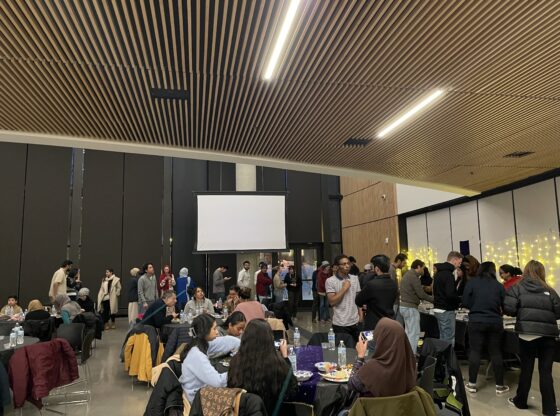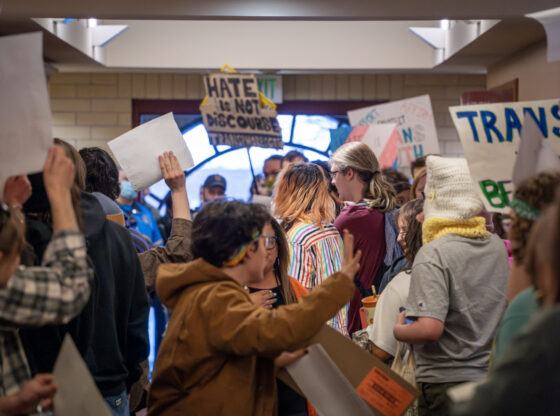The Aurora GEO ICE Detention Center has been under fire in the media in recent years regarding the inhumane living conditions of immigrant detainees within the facility.
The Aurora GEO ICE Processing Center is privately owned by GEO Group, which is a corporation that invests in privately owned prisons and mental health facilities, and it is one of their many detention facilities that serve under the U.S. Immigration & Customs Enforcement (ICE) and U.S. Marshals Service. The Aurora location rose in Dec. 1986 when the U.S. Immigration and Naturalization Service, now ICE, gave GEO Group a contract under a competitive bid process for 150 detainees and today can hold up to 1,532 people.
In the Jason Crow accountability reports, there were 675 detainees within the facility during the week inspection of Sept. 22, 2021. According to Jenny Regier, an Equal Justice Works Fellow sponsored by Pfizer Inc. at Rocky Mountain Immigrant Advocacy Network (RMIAN), the people held within this immigration detention facility are awaiting their court hearings and proceedings.
Here are five things that happened in Aurora’s GEO ICE Detention Center:
Lack of minimum wage for detainees
A lawsuit was filed in 2014 by nine current and former detainees against the GEO Group facility in Aurora. Detainees explained they were being paid $1 a day for their work and services within the facility.
The history of the $1 a day wage dates back to World War II internment camps where people who were held were paid 80 cents a day for their work. In 1950, U.S. Congress issued authorization for people in detention to work for $1 a day, and this wage rate would be adjusted from time to time accordingly as said in the Immigration Expenses (8 USC 1555). However, this was enforced for only 29 years, and ICE and private prison companies set the minimum wage at 1.7% of the federal minimum wage.
Staff Attorney Tilman Jacobs at Rocky Mountain Immigrant Advocacy Network (RMIAN), who works directly with individuals detained in the Aurora ICE Detention Center, said, “It’s changed, they [Aurora ICE Detention Center] actually hire people to do those sorts of undesirable manners of work. It’s in response to advocacy efforts that these changes have been made
Threat of Solitary Confinement
According to unveiled documents from a federal court case in July 2015, detainees of the Aurora GEO ICE Detention Center were randomly selected and required to clean the spaces within the facility or face being threatened with solitary confinement.
Detainees have an opportunity to volunteer for work under the Voluntary Work Program. Under Section C: “Personal Housekeeping Required” of this article in the Performance-Based National Standards, it states that detainees are “required to keep their immediate living areas in a neat and orderly manner,” and does not mention any other areas within the facility that are required to be maintained by detainees.
This act of detainees being forced to clean communal areas outside of their immediate living space or facing punishment by solitary confinement violates ICE’s Performance-Based National Detention Standards.
Pablo Paez, GEO Group’s vice president, said, “In all instances, our employees appropriately followed the procedures and rules that govern the use of Special Management Housing Units, which are prescribed in detail in the federal government’s Performance-Based National Detention Standards.”
High COVID-19 Cases
According to the U.S. Immigration and Customs Enforcement, the Aurora ICE Detention Center has had over 780 total confirmed COVID-19 cases, and currently has 7 confirmed cases under isolation or monitoring as of Apr. 5, 2022.
“Detention centers are congregate settings where the risk of contracting the virus is much higher than in many other settings. Nationally, as well, it’s hard to implement any of the other measures that can be effective in fighting the virus whether that’s masks or social distancing, which is very difficult in immigration detention,” said Regier.
According to Regier, RMIAN has reached out to elected officials to provide vaccine access for people in immigration detention, and Tri-County Health has been going to the facility to offer vaccines and give information as well.
Family Separation Cases
In 2018, the Aurora ICE Detention Center was estimated to have had about 50 parents detained, who fled from their home countries to flee from extreme danger in their home countries and to protect their kids. According to RMIAN, they estimated about 20% of parents they worked with were discharged from the facility, and only two were reunited with their children.
When the Trump Administration was in office, they issued the Zero Tolerance Policy, which resulted in the separation of thousands of children from their parents. In response to the adverse effects of this policy, the Biden-Harris Administration launched a Family Reunification Task Force on Feb. 2, 2021 to reunify families that were separated at the U.S-Mexico border.
Regarding family separation cases today at the Aurora ICE Detention Center, these types of cases are rare. “We did recently have an individual who was trying to be connected with a child, but that’s pretty rare. We don’t get many cases like these,” said Jacobs.
Prolonged Confinement
In the case of Villaescusa-Rios v. Choate, Oscar Villaescusa-Rios was an immigrant detainee who was held for 925 days without due process in the Aurora ICE Detention Center. According to a 2003 U.S. Supreme Court Case decision of Demore v. Kim, Chief Justice William H. Rehnquist stated that it was allowable to hold detainees to be detained for a brief period for removal proceedings.
A GEO Group representative told Colorado Politics that as “a contractor of ICE,” “our company plays absolutely no role in decisions related to the assignment, transfer or release of individuals at ICE Processing Centers.”
According to Jacobs, generally, if someone is detained, the Board of Immigration Appeals (BIA) tries to decide their case very quickly. Though, this is not always the case such as in the instance of the pandemic. “Sometimes it’s a very complicated case and it takes them a while to reach a decision and the pandemic affected that, so I had detained cases that took quite a while last year,” said Jacobs.
As issues regarding immigration both inside and outside of the United States continue to surge, the Aurora ICE Detention Center continues to fall into many categories of these conversations.










